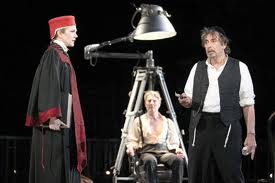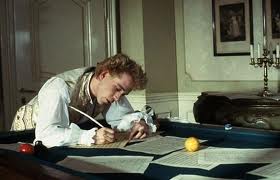Jimmy Rushing sings “Goin’ to Chicago Blues” on a 1958 episode of The Subject Is Jazz, accompanied by an all-star band led by Buck Clayton:
Archives for November 2010
TT: Almanac
“Indeed, I simply can’t imagine competence as anything save admirable, for it is very rare in this world, and especially in this great Republic, and those who have it in some measure, in any art or craft from adultery to zoology, are the only human beings I can think of who will be worth the oil it will take to fry them in Hell.”
H. L. Mencken, Heathen Days (courtesy of Margaret Hivnor)
TT: The Merchant of Broadway
The big news in New York theater this week is the opening of the Broadway transfer of the Public Theater’s production of The Merchant of Venice. Accordingly, The Wall Street Journal asked me to write a special review for today’s Greater New York section. Here’s an excerpt.
* * *
 When I reviewed the Public Theater’s Central Park production of “The Merchant of Venice” in June, I said that it might end up on Broadway, and that it deserved to. This has now happened, and the main reason for the transfer is, needless to say, Al Pacino. Even so, what was true six months ago is still true today: Mr. Pacino is a galvanic Shylock, but this “Merchant” would be more than good enough to play on Broadway no matter who was in the title role. The best news is that Daniel Sullivan and Mark Wendland, the director and set designer, have managed to take a site-specific outdoor production and move it to the proscenium stage of the Broadhurst Theatre without any loss of theatrical potency. If anything, the show is more tightly focused in its smaller indoor home.
When I reviewed the Public Theater’s Central Park production of “The Merchant of Venice” in June, I said that it might end up on Broadway, and that it deserved to. This has now happened, and the main reason for the transfer is, needless to say, Al Pacino. Even so, what was true six months ago is still true today: Mr. Pacino is a galvanic Shylock, but this “Merchant” would be more than good enough to play on Broadway no matter who was in the title role. The best news is that Daniel Sullivan and Mark Wendland, the director and set designer, have managed to take a site-specific outdoor production and move it to the proscenium stage of the Broadhurst Theatre without any loss of theatrical potency. If anything, the show is more tightly focused in its smaller indoor home.
Shakespeare on Broadway has tended in recent seasons to be spotty, usually because of the stunt casting that makes such productions as Jude Law’s “Hamlet” financially feasible. Fortunately, Mr. Pacino’s performance, in which he plays Shylock as an old-fashioned “stage Jew” driven to the edge of madness by his lust for revenge, is no stunt. He is a veteran stage actor who knows how to nail every line to the auditorium’s back wall, and even if you think he’s flirting with caricature–which he is–you’ll find the results enthralling…
Would that the cheap seats were a whole lot cheaper, but don’t begrudge Mr. Pacino his big-name salary. He’s earning every cent of whatever he’s being paid–and then some. You’ll never see a more exciting “Merchant of Venice,” or a more thought-provoking one.
* * *
The print version of the Journal‘s Greater New York section only appears in copies of the paper published in the New York area, but the complete contents of the section are available on line, and you can read my review of The Merchant of Venice by going here.
TT: Not quite as bad as a fire
 After a lengthy stretch of largely contented residence on the Upper West Side of Manhattan, Mrs. T and I are exchanging Central Park West for Fort Tryon Park and moving uptown to Washington Heights later this week. Our goal was to find a larger apartment in a quiet, comfortable neighborhood that can be reached easily by subway, and we think we’ve succeeded. Needless to say, the proof of the pudding is in the living, and I’ll keep you abreast of how our new life in Washington Heights shapes up.
After a lengthy stretch of largely contented residence on the Upper West Side of Manhattan, Mrs. T and I are exchanging Central Park West for Fort Tryon Park and moving uptown to Washington Heights later this week. Our goal was to find a larger apartment in a quiet, comfortable neighborhood that can be reached easily by subway, and we think we’ve succeeded. Needless to say, the proof of the pudding is in the living, and I’ll keep you abreast of how our new life in Washington Heights shapes up.
For the moment, though, our immediate concern is transferring several thousand books and compact discs and some two dozen works of art from Apartment No. 1 to Apartment No. 2, a task that I expect will keep both of us preoccupied for the next few days (at least!). To this end, I won’t be doing any blogging this week outside of the usual daily postings.
I hope to be back again next Monday. In the meantime, please send lovely thoughts our way as we tear up our old lives and march anxiously toward the future….
TT: Almanac
“The more one suffers, the more, I believe, has one a sense for the comic. It is only by the deepest suffering that one acquires true authority in the use of the comic, an authority which by one word transforms as by magic the reasonable creature one calls man into a caricature.”
Søren Kierkegaard, Stages on Life’s Way
NO, YOU CAN’T
“What do you think of when you hear the word ‘genius’? Most of us, I suspect, picture a fellow in a white coat who squints into a microscope, twiddles a knob, and says, “Eureka! I’ve found the cure for cancer!” More often than not, though, scientific and creative discoveries are the result not of bolts of mental lightning but of long stretches of painfully hard slogging…”
TT: Not for the faint of heart!!
In today’s Wall Street Journal drama column, I review two New York shows that are more than a bit off the beaten path of convention, Teller’s Play Dead and Paul Reubens’ The Pee-wee Herman Show. Here’s an excerpt.
* * *
Without spoiling any of its secrets, I can say that “Play Dead” is a slicked-up version of a good old-fashioned Saturday-night spook show in which Todd Robbins, Mr. Teller’s co-author and onstage alter ego, tells the more or less true stories of a serial killer, two phony mediums, a geek (look it up) and a murder victim whom Mr. Robbins knew in real life. During and in between these narratives, things…happen. The nature of these grisly occurrences can best be summarized by saying that the white suit worn by Mr. Robbins grows steadily redder throughout the evening.
 Seeing as how the creators of “Play Dead” are both veteran stage magicians, it stands to reason that you’ll see–or think you saw–some spectacular and seemingly inexplicable illusions, including the eating of a lightbulb and the murder of an audience member. But what really drives the show is the contempt in which its makers rightly hold those charlatans who use “magic” to defraud the public. The middle section of “Play Dead,” for instance, is a Houdini-like reenactment of a fake séance that is at one and the same time funny, furious and wholly enthralling….
Seeing as how the creators of “Play Dead” are both veteran stage magicians, it stands to reason that you’ll see–or think you saw–some spectacular and seemingly inexplicable illusions, including the eating of a lightbulb and the murder of an audience member. But what really drives the show is the contempt in which its makers rightly hold those charlatans who use “magic” to defraud the public. The middle section of “Play Dead,” for instance, is a Houdini-like reenactment of a fake séance that is at one and the same time funny, furious and wholly enthralling….
Unlikely as it may sound, it’s been 20 years since “Pee-wee’s Playhouse” went off the air, which means that the Broadway transfer of “The Pee-wee Herman Show” is above all a nostalgia act aimed at thirtysomethings who spent their Saturday mornings watching Paul Reubens’ cheerfully ironic take on children’s TV. Many such folk were present when I saw a press preview of the show last week, and they made their presence known, lustily cheering all their favorite bits. If you, too, were a fan, all you need to know is that Mr. Reubens, who is now 58, is still playing the part of a weirdly spritely man-child and that he has given us what is in essence a 90-minute-long stage version of his TV show, complete with talking furniture and peculiar playmates. Except for the superlative puppetry of Basil Twist, the main difference between Pee-wee then and now is that the script of “The Pee-wee Herman Show” is thickly larded with double entendres, jokes about gay marriage and other nudge-nudge-wink-wink nods to its now-grown fans….
* * *
Read the whole thing here.
TT: No, you can’t
 Are geniuses made, not born? I just read a new book called Sudden Genius? in which the British biographer Andrew Robinson offers an admirably balanced take on this controversial topic–far more balanced than the one to be found in Malcolm Gladwell’s Outliers, which comes dangerously close to arguing that genius doen’t exist at all. In my “Sightings” column for today’s Wall Street Journal, I compare and contrast these two points of view:
Are geniuses made, not born? I just read a new book called Sudden Genius? in which the British biographer Andrew Robinson offers an admirably balanced take on this controversial topic–far more balanced than the one to be found in Malcolm Gladwell’s Outliers, which comes dangerously close to arguing that genius doen’t exist at all. In my “Sightings” column for today’s Wall Street Journal, I compare and contrast these two points of view:
Andrew Robinson examines key moments in the lives of such giants as Marie Curie, Charles Darwin, Albert Einstein and Leonardo da Vinci. The conclusion that he draws from their experience is that creative genius is “the work of human grit, not the product of superhuman grace.” Along the way, Mr. Robinson also takes time out to consider one of the most fashionable modern-day theories of genius–and finds it wanting.
The theory is known in England as “the 10-year rule” and in the U.S., where it has been popularized by Malcolm Gladwell, the author of “Outliers,” as “the 10,000-hour rule.” The premise is the same: To become successful at anything, you must spend 10 years working at it for 20 hours each week. Do so, however, and success is all but inevitable. You don’t have to be a genius–in fact, there’s no such thing.
K. Anders Ericsson, the psychologist who is widely credited with having formulated the 10,000-hour rule, says in “The Making of an Expert,” a 2007 article summarizing his research, that “experts are always made, not born.” He discounts the role played by innate talent, citing Wolfgang Amadeus Mozart as an example….
The problem with the 10,000-hour rule is that many of its most ardent proponents are political ideologues who see the existence of genius as an affront to their vision of human equality, and will do anything to explain it away. They have a lot of explaining to do…
Read the whole thing here.
